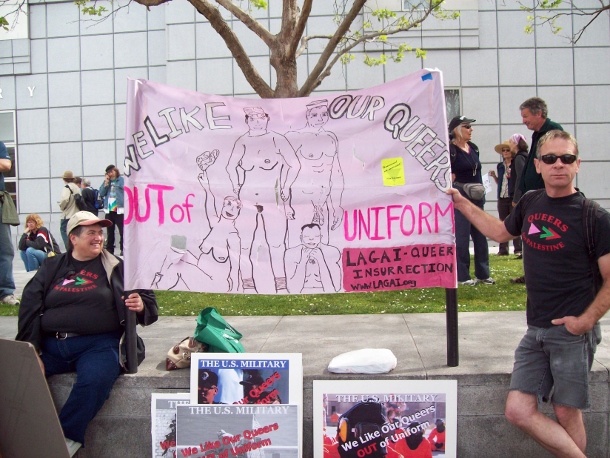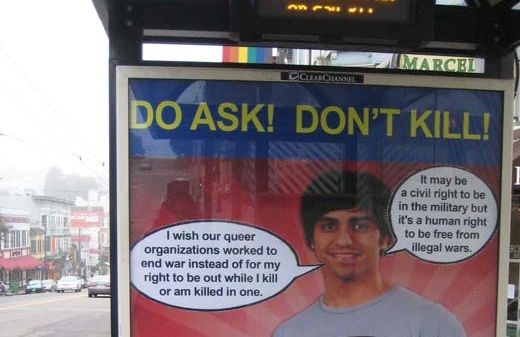This article was originally published on Waging Nonviolence

Is all inclusion good inclusion?
Mainstream LGBTQ groups like the Human Rights Campaign promote any increase in gay representation as good — even representation in some of the world’s most deadly organizations, like the U.S. military and the Central Intelligence Agency.
“It’s either you’re with Trump and against trans military service, or you celebrate trans military service as a wonderful thing for trans people,” said Dean Spade, co-founder of a New York-based trans justice organization called the Sylvia Rivera Law Project. A few weeks after participating in a Queer Anti-Militarism Town Hall held in Seattle’s Public Library on April 2, Spade spoke about how a network of queer anti-war activists is working to undo the mainstream narrative.
This summer, Spade and trans anti-war activists across the country will coordinate protests and info-booths at Gay Pride events to “offer people real information about military service and what the U.S. military is doing all over the planet.”
They won’t be the first queers to take up the anti-war cause. Deeg Gold is a longtime activist with the group Lesbians and Gays Against Intervention, or LAGAI, which formed in the Bay Area in the 1980s to combat U.S.-sponsored terror in Latin America. To Gold, the ability to serve in the military isn’t at all the version of liberation they (Gold uses gender-neutral pronouns they and them) were fighting for when they started their activism in the 1970s.
Later, during the first Gulf War, LAGAI came out with its “We Like Our Queers Out of Uniform” campaign. Released in the summer of 1992, the campaign’s associated zinecontains narratives about queer conscientious objectors and people who joined the military only to regret it later. The group even debated military inclusion on Sally Jessie Raphael’s daytime talk show on NBC. A “We Like Our Queers Out of Uniform” banner showed up at the 1993 March on Washington, and reappeared at various anti-war actions over the years. Members dusted off campaign signs as recently as April 15 in Oakland, for an anti-war rally highlighting U.S. bombing in Syria.

People like Gold and Spade are actively working to blow up the idea that representation matters more than the lives of people lost through our country’s acts of aggression. They’re up against LGBTQ groups who have more money and slick public relations teams.
‘Perverts’ on the payroll
The official shirt of the 2018 Lesbians Who Tech conference reads: “Lesbians Who Tech. Queer. Inclusive. Badass.” The shirt does not, however, mention that the conference has been openly sponsored for the last two years by none other than the Central Intelligence Agency.
“It is hard to imagine that any queers would knowingly associate themselves with the CIA, given its history of overthrowing progressive governments, and putting brutal dictatorships in place, and the torture conducted at facilities such as Abu Ghraib,” Gold said. “Not to mention the recent revelations of the CIA spying on people in the United States.”
An audience member at the April 2 Queer Anti-Militarism Town Hall, Corinne Manning, agreed. She said the pro-LGBTQ propaganda on the CIA’s website is an “attractive illusion.” She said the message to LGBTQ people is that “as long as you are the one surveilling, the one torturing, and as long as you collude with institutions that terrorize, you get to be ‘safe.’”
In an email exchange, Lesbians Who Tech founder Leanne Pittsford proudly stated that her group is “the largest LGBTQ technology community in the world, committed to visibility, intersectionality and changing the face of technology.” Pittsford names a real problem: At the same time, the tech industry’s hard-to-penetrate white-and-Asianbro culture has spurred a thousand calls for increasing diversity within Big Tech companies.
The popular tech developer website StackOverflow surveys its users each year, including on industry demographics. It found that 85 percent of respondents were white or Asian. More than 92 percent identified as male and more than 93 percent were straight. Under pressure to hire outside these populations, companies are embracing queers across the rainbow spectrum.
Plenty of LGBTQ people want a piece of the pie, as the 5,000-strong Lesbians Who Tech conference in San Francisco this year made clear. One of the March gathering’s main speakers was Sandy Adams, a director at the military contractor Raytheon. Adams made her pitch for inclusion in the company’s missile technology program on the stage of the city’s Castro Theater against a backdrop of an enormous American flag — a moment one attendee called “cringe-worthy.” For those seeking to diversify companies that feed the military-industrial complex, the question is whether the quest for fairer labor opportunities can be untangled from the human cost of war.
From its earliest days, the CIA had an anti-gay agenda. In declassified documents from 1950, the CIA’s very first director, Roscoe H. Hillenkoetter, explained to Congress that gays were “perverts” who had innate “psychopathic tendencies which affect the soundness of their judgment, physical cowardice, susceptibility to pressure, and general instability.”
“Homosexuals,” Hillenkoetter said, “are often too stupid to realize it, or through inflation of their ego or through not letting themselves realize the truth, they are usually the center of gossip, rumor, derision, and so forth.” Under Hillenkoetter, the CIA helped to purge hundreds of suspected “perverts” from the U.S. government during what became known as the Lavender Scare of the 1950s.
As Deeg Gold mentioned, the CIA has long used covert intervention in U.S. culture as a means to stifle dissent and progressive ideas. Under Hillenkoetter, the CIA created the anti-communist Congress for Cultural Freedom, which eventually had offices in 35 countries and published lifestyle magazines and funded artists to popularize its missions in the United States and abroad. It organized classical and jazz concerts, abstract impression art exhibits, and even employed cultural icons like Louis Armstrong, Jackson Pollock and Gloria Steinem.
Later, Gold continued, “during the movement against the Vietnam War, we found out that a number of the ‘leaders’ of the National Student Association were being paid by the CIA. They pushed for anti-communist policies in student organizations, attended international conferences to make contacts and collect information, and undermined the U.S. student peace movement.” Now, Gold said, it’s using identity politics and “progressive” hiring policies to justify acts of terror, and “queer groups are falling for it.”
By 2012, the CIA was holding its own Pride celebration at the Pentagon. According to Kate Kendall — the long-time executive director of the National Center for Lesbian Rights, who has spoken at several Lesbians Who Tech conferences — it’s a sign of progress. “In virtually every facet of civil life the lives and opportunities for LGBT [people] are elevated,” she said. “We used to be criminals in the eyes of our government and now a career in the CIA is not only an option, but they are recruiting us!”
This excitement would not likely be shared by the dozens of Pakistani transgender people who, in 2012, called for an end to the CIA’s drone strikes in their country. That year, trans people held a public protest against the growing number of deadly drone strikes by the Obama administration, which resulted in hundreds of civilian deaths. The Pakistani trans group, led by a trans woman named Sanam Fakir, made it clear that queer and trans people overseas were being killed by the same U.S. agencies that were holding Gay Pride parties back on American soil.
Speaking about the CIA’s program to recruit queers that began a decade ago, Gold called the “progressive” hiring campaign similar to a pro-gay public relations campaign funded by the Israeli government. “It’s just like the Zionist-Israeli tactic of pinkwashing [or the use of liberal-leaning policies on sexuality to cover up violence and terror],” they said. “It’s almost as if they hired the same consultant.” Queer Palestinian groups such as ASWAT – Palestinian Gay Women have openly opposed U.S. complicity in the violence. Israel receives more than $3 billion in U.S. military aid each year.
One of the CIA’s major contractors is Google, which provides the agency with drone technology. Meanwhile, it has attempted to counteract the flak it has gotten for a lack of diversity among its staff through major sponsorships for Lesbians Who Tech and San Francisco Gay Pride, the world’s largest gay event. Google’s most famous intracompany slogan may be “Don’t be evil,” but it and many of the world’s largest tech companies can’t get around the fact that they’ve been part of the U.S. war machine for many years.
“Technology isn’t inherently a bad thing,” said Soya Jung, a queer racial justice activist based in Seattle who participated in the April Queer Anti-Militarism Town Hall with Spade. The problem is that “if it continues without ethical critique, without questioning who and what the technology is for,” it can become a source for suffering, whether intentional or not. “Faster, cheaper, and more effective surveillance and drone technology and military logistics, for example, are aiding and abetting the deaths not only of queers, but of poor and marginalized people.”
Question everything
A lesbian in tech who declined to be named because of fears around her job — we’ll call her Alison — noted plenty of reasons that queer coders might be drawn to companies like Raytheon. “Big companies that have contracts with the military include companies that pay really well, are impressive to say you work at, and are solving interesting technical challenges,” she explained. “Some people have a lot of debt from school and are happy to work at a big tech company if they can.” That doesn’t excuse the fact, she said, that missile systems like the ones Raytheon helps create “are mostly used to kill black and brown people, some of whom are queer, all over the world.”

Still, the connection isn’t always an obvious one to make. As Alison pointed out, people who work for companies like Raytheon “are probably not having their work framed as ‘How do we solve the problem of remotely killing people more efficiently?’” She added, “I think there’s a lot of ideological work” that tech companies do “to wrap up the stuff they make with workers’ identities in a way that makes it hard for people to” be critical about their workplaces. (In the wake of the Cambridge Analytica scandal that is still unraveling, for example, some Facebook employees made it clear in internal discussions that they were company loyalists, no matter the cost.)
That is why the work of queer anti-war organizers is so vital. Activists like Gold and Spade believe we could all stand to remember the ideological work of earlier queer struggles instead of the CIA or corporations. For example, the 1969 queer uprisings against police brutality at the Stonewall Inn in New York City (or the less-celebrated, earlier riots at Cooper’s Donuts in Los Angeles and Compton’s Cafeteria in San Francisco), considered by many to be the sparks that lit the modern gay liberation movement. Or the organizing in the 1980s and 1990s against the government and Big Pharma companies who refused to act on HIV/AIDS. Or the unrelenting voices of trans women of color like Miss Major Griffin-Gracy, Marsha P. Johnson, and Sylvia Rivera, who demanded the microphone when gay and lesbian groups refused to speak on transgender issues.
The world needs a queer perspective on U.S. aggression “now more than ever,” said Jung. Queer people have survived despite the narrow confines of an anti-LGBTQ society-at-large, and that has given many people facing widespread discrimination and violence the priceless ability to question the status quo while working toward a world with less suffering. “Whatever material or social appeal the CIA offers,” she said, “isn’t worth bartering that away.”
